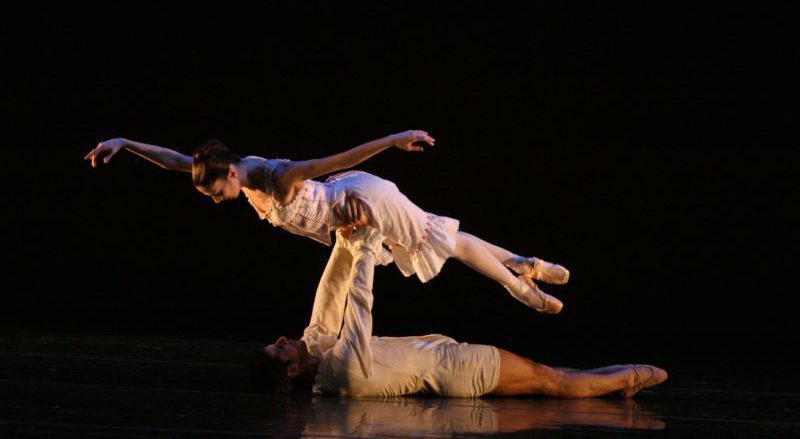INTERVIEW: Dances Patrelle investigates business of ‘American Dream’
One might think a deep investigation into the promises, both empty and realized, of the American dream would be best suited for a college classroom. However, the dancers at Dances Patrelle, under the direction of Francis Patrelle, are tackling that issue in their new spring season.
With performances beginning April 12 and continuing through April 14, Dances Patrelle’s shows feature the world premiere of The American Dream: It’s Only Business, choreographed by Patrelle. It will join revivals of Madame X and American Overture.
American Dream is set to César Franck’s Piano Quintet in F Minor, and Patrelle’s choreography details the obstacles of three families, from the upper, middle and working classes.
Recently Hollywood Soapbox exchanged emails with Patrelle about the new spring season. Questions and answers have been slightly edited for style.
What inspired The American Dream: It’s Only Business?
The idea came from my friend, the writer Justin Allen. Over the years I have tackled political issues in my ballets lots of times. In What Do We Do About Mother? I addressed elder care and how it affects families. For Glad to Be Unhappy I went after the coming out experience, and not just for the person coming out, but for those who love that person. With Come Rain, Come Shine I set the whole ballet in a boxing ring and looked at the so-called battle of the sexes as real pugilism.
I have done my artsy ballets as well, and my happy ballets, and my comedies. But doing work that says something, that has a point, has always been dear to my heart.
Justin told me that he was sick in bed when he had a vision of a ballet that looked at the way social class pushes and pulls all of us, no matter what circumstances our families might be in. He said he thought it would be a great Patrelle ballet. And he was right. It’s an issue that is all over the place.
How often do we hear about the 1 percent? The struggle of the working poor? The destruction of the middle class? I had to do it.
Is it important for your work to touch upon social and political issues?
It’s important for every artist to say something. If you just make a pretty ballet, that says something, too. Maybe people need to escape. Or maybe we need beauty and joy to show us that we can share in wonderful things. But we need to face up to how people feel, and struggle, and suffer, too. Right now, in this environment, it may be more important to touch on social and political issues than at any time since the ’60s.
How challenging is this world premiere from a physical standpoint?
For me it has been almost overwhelming. I will be 72 this year. Thank God the dancers I work with have been so giving, so up to the challenge of hearing my ideas, understanding what I am going for, and working to make art happen without my showing them steps. I can’t tell you how different it is choreographing at 72 than it was at 42. But I am blessed. I still love the work. And I still so love the dancers. And I get to make art. I am truly blessed.
When building an evening of dance, featuring several different routines, what is going through your mind? What are you trying to achieve for the entire evening?
For this, Dances Patrelle’s 30th season, I wanted to showcase a bit of everything … at least in some way. I wanted to bring back Madame X to show off Dances Patrelle’s dramatic repertoire. Abi Stafford and Ask La Cour are going to make the audience swoon!
Over the years I have also been so gifted with collaborators. The work done for Madame X by composer Patrick Soluri and designers Rita B. Watson and David Grill are not to be missed.
With American Overture I wanted to showcase a technical tour-de-force of ballet. American Overture is being danced by Reed Tankersley, and I am so proud of the way he is taking on a very difficult solo — I call it Uncle Sam on Acid — and making it burst with energy and life.
And finally, I had to do something new. I wanted to share the choreographer I am today — the thinking, caring and thoughtful choreographer I want to be. And so I am so proud to premiere The American Dream: It’s Only Business. As an evening of dance, I think this showcases 30 years very well. I am very proud of what we are going to put on that stage.
How do you find your individual dancers for a specific dance? Auditions? Word of mouth? Previous collaborations?
After 30 years of working with the greatest dancers working on the stage anywhere, it is my joy to say that there won’t be a single person dancing with us who I did not already know and love, both as dancers and as people. These artists have stuck with me through literally dozens of ballets. I wouldn’t trade them for the world.
But I can’t end without talking about the kids. I have worked with kids for my whole career. This year, they seem to have grown up. Six of our adult dancers this year started with me as children, some as young as 7 years old. It brings tears to my eyes to think of all that they have given to me over the years. And now here they are, grown up and making art with me again. It’s a dream come true.
By John Soltes / Publisher / John@HollywoodSoapbox.com
Dances Patrelle presents its spring season April 12-14 at New York Live Arts in New York City. Click here for more information and tickets.

